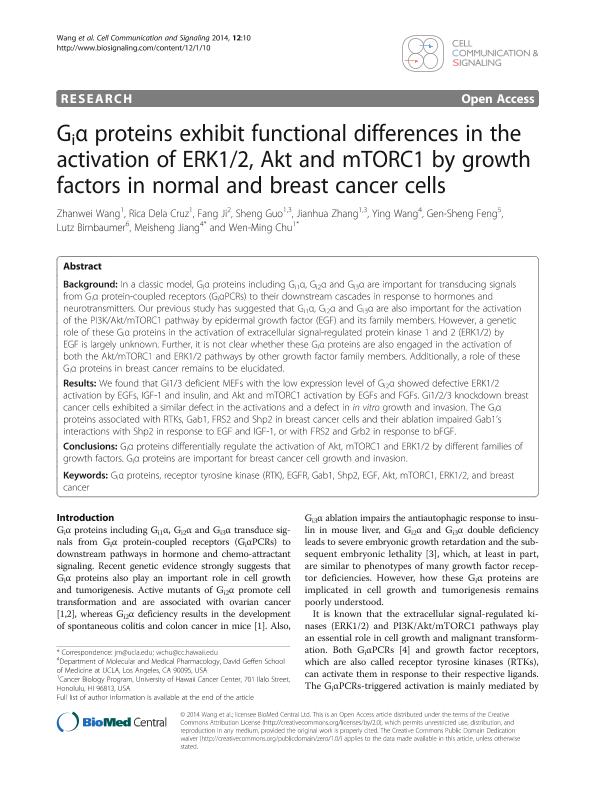Mostrar el registro sencillo del ítem
dc.contributor.author
Wang, Zhanwei
dc.contributor.author
Dela Cruz, Rica
dc.contributor.author
Ji, Fang
dc.contributor.author
Guo, Sheng
dc.contributor.author
Zhang, Jianhua
dc.contributor.author
Wang, Ying
dc.contributor.author
Feng, Gen-Sheng
dc.contributor.author
Birnbaumer, Lutz

dc.contributor.author
Jiang, Meisheng
dc.contributor.author
Chu, Wen Ming
dc.date.available
2018-01-15T15:02:22Z
dc.date.issued
2014-02
dc.identifier.citation
Guo, Sheng; Birnbaumer, Lutz; Zhang, Jianhua; Wang, Ying; Ji, Fang; Dela Cruz, Rica; et al.; Giα proteins exhibit functional differences in the activation of ERK1/2, Akt and mTORC1 by growth factors in normal and breast cancer cells; BioMed Central; Cell Communication and Signaling; 2014; 2-2014; 1-12
dc.identifier.issn
1478-811X
dc.identifier.uri
http://hdl.handle.net/11336/33216
dc.description.abstract
Background In a classic model, Giα proteins including Gi1α, Gi2α and Gi3α are important for transducing signals from Giα protein-coupled receptors (GiαPCRs) to their downstream cascades in response to hormones and neurotransmitters. Our previous study has suggested that Gi1α, Gi2α and Gi3α are also important for the activation of the PI3K/Akt/mTORC1 pathway by epidermal growth factor (EGF) and its family members. However, a genetic role of these Giα proteins in the activation of extracellular signal-regulated protein kinase 1 and 2 (ERK1/2) by EGF is largely unknown. Further, it is not clear whether these Giα proteins are also engaged in the activation of both the Akt/mTORC1 and ERK1/2 pathways by other growth factor family members. Additionally, a role of these Giα proteins in breast cancer remains to be elucidated. Results We found that Gi1/3 deficient MEFs with the low expression level of Gi2α showed defective ERK1/2 activation by EGFs, IGF-1 and insulin, and Akt and mTORC1 activation by EGFs and FGFs. Gi1/2/3 knockdown breast cancer cells exhibited a similar defect in the activations and a defect in in vitro growth and invasion. The Giα proteins associated with RTKs, Gab1, FRS2 and Shp2 in breast cancer cells and their ablation impaired Gab1’s interactions with Shp2 in response to EGF and IGF-1, or with FRS2 and Grb2 in response to bFGF. Conclusions Giα proteins differentially regulate the activation of Akt, mTORC1 and ERK1/2 by different families of growth factors. Giα proteins are important for breast cancer cell growth and invasion.
dc.format
application/pdf
dc.language.iso
eng
dc.publisher
BioMed Central

dc.rights
info:eu-repo/semantics/openAccess
dc.rights.uri
https://creativecommons.org/licenses/by-nc-sa/2.5/ar/
dc.subject
Giα Proteins
dc.subject
Receptor Tyrosine Kinase (Rtk)
dc.subject
Egfr
dc.subject
Gab1
dc.subject
Shp2
dc.subject
Egf
dc.subject
Akt
dc.subject
Mtorc1
dc.subject
Erk1/2
dc.subject
Breastcancer
dc.subject.classification
Otras Ciencias Biológicas

dc.subject.classification
Ciencias Biológicas

dc.subject.classification
CIENCIAS NATURALES Y EXACTAS

dc.title
Giα proteins exhibit functional differences in the activation of ERK1/2, Akt and mTORC1 by growth factors in normal and breast cancer cells
dc.type
info:eu-repo/semantics/article
dc.type
info:ar-repo/semantics/artículo
dc.type
info:eu-repo/semantics/publishedVersion
dc.date.updated
2018-01-08T19:49:01Z
dc.journal.volume
2014
dc.journal.pagination
1-12
dc.journal.pais
Reino Unido

dc.journal.ciudad
Londres
dc.description.fil
Fil: Wang, Zhanwei. University of Hawaii Cancer Center. Honolulu; Estados Unidos
dc.description.fil
Fil: Dela Cruz, Rica. University of Hawaii Cancer Center. Honolulu; Estados Unidos
dc.description.fil
Fil: Ji, Fang. Shanghai Jiao Tong University . Sahnghai; China
dc.description.fil
Fil: Guo, Sheng. University of Hawaii Cancer Center. Honolulu; Estados Unidos. Shanghai Jiaotong University. Shangha; Estados Unidos
dc.description.fil
Fil: Zhang, Jianhua. Shanghai Jiaotong University. Shangha; Estados Unidos. University of Hawaii Cancer Center. Honolulu; Estados Unidos
dc.description.fil
Fil: Wang, Ying. David Geffen School of Medicine at UCLA. Los Angeles; Estados Unidos
dc.description.fil
Fil: Feng, Gen-Sheng. University of California at San Diego; Estados Unidos
dc.description.fil
Fil: Birnbaumer, Lutz. Consejo Nacional de Investigaciones Científicas y Técnicas; Argentina. National Institutes of Health; Estados Unidos
dc.description.fil
Fil: Jiang, Meisheng. David Geffen School of Medicine at UCLA. Los Angeles; Estados Unidos
dc.description.fil
Fil: Chu, Wen Ming. University of Hawaii Cancer Center. Honolulu; Estados Unidos
dc.journal.title
Cell Communication and Signaling

dc.relation.alternativeid
info:eu-repo/semantics/altIdentifier/doi/http://dx.doi.org/10.1186/1478-811X-12-10
dc.relation.alternativeid
info:eu-repo/semantics/altIdentifier/url/https://biosignaling.biomedcentral.com/articles/10.1186/1478-811X-12-10
Archivos asociados
